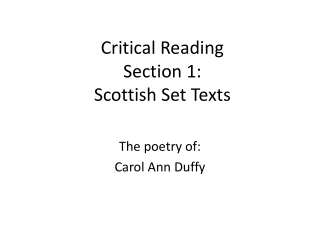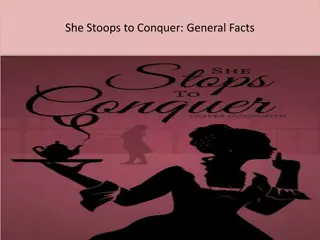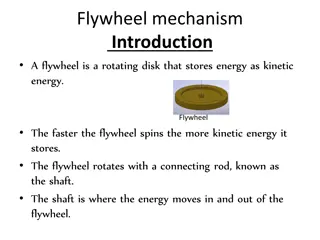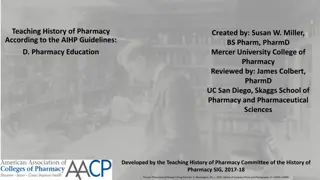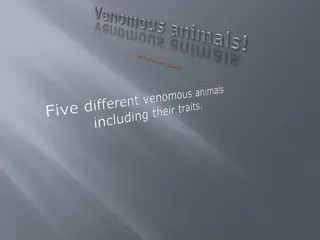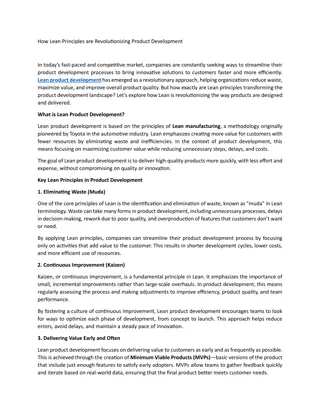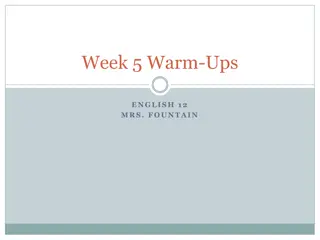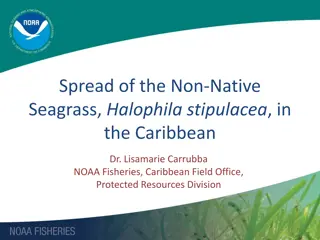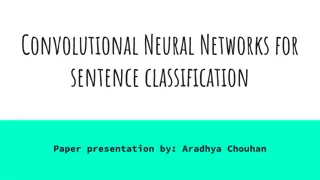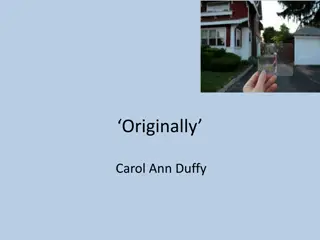
The Poem 'Originally' by Carol Ann Duffy
Explore the autobiographical journey of Carol Ann Duffy in her poem 'Originally', focusing on themes of isolation, confusion, and identity. Delve into the poet's feelings of displacement and the impact of childhood memories on shaping one's sense of self amidst transitions. Discover the structure, imagery, and emotional nuances within the poem, reflecting on the poet's anxiety, uncertainty, and reflections on belonging.
Download Presentation

Please find below an Image/Link to download the presentation.
The content on the website is provided AS IS for your information and personal use only. It may not be sold, licensed, or shared on other websites without obtaining consent from the author. If you encounter any issues during the download, it is possible that the publisher has removed the file from their server.
You are allowed to download the files provided on this website for personal or commercial use, subject to the condition that they are used lawfully. All files are the property of their respective owners.
The content on the website is provided AS IS for your information and personal use only. It may not be sold, licensed, or shared on other websites without obtaining consent from the author.
E N D
Presentation Transcript
Overview Autobiographical Focus on isolation and confusion felt as a result of move from to England Examines literal and metaphorical journey Examines to what extent our identify is shaped by our environment Moves from personal memories to reflection on the subject of childhood
Structure Three stanza of 8 lines Stanza one recalls the journey from Glasgow towards her new home Stanza two explores her initial sense of not fitting in to this new landscape. In the third stanza she considers the larger question about how our sense of identity is formed, shaped and affected by such transitions
Structure The poet s anxiety and uncertainty is revealed through the lack of a regular rhyme scheme which reinforces the lack of order in her life. Series of fragmented memories, using deliberately childish words or phrases, is reminiscent of the way most of us recall our own childhood and adds to the authenticity.
We came from our own country. Move affected the entire family Assonance of our own reinforces her definite sense of belonging to and possession of a particular place. Illustrates the overall negative attitude to the move
red room which fell through the fields. describes the interior of the train The colour red has connotations of passion or anger, perhaps reflecting her own feelings about being forced to leave the city of her birth and early childhood. At the same time, the word choice and alliteration of fell and fields emphasises her feelings of impotence and lack of control in the making of this important decision.
our mother singing/our fathers name to the turn of the wheels. The optimistic mood of her mother acts as a distinct contrast to the obvious negativity of Duffy herself Also slightly ambiguous - the reader is unsure whether their father is in the train carriage with them or if they are travelling to meet him at their destination.
Home, Home. the behaviour of her younger brothers whose emotions seem to reflect her own: they are crying and one of them is bawling The repetition and capitalisation of the word home reinforces the misery and overwhelming sense of loss and separation that she associates with this time.
the miles rushed back to the city to emphasise her own desire to return to Glasgow, to reverse this trip and reinhabit rushed potentially emphasises that she has not had enough time to say goodbye to her old life.
the street, the house, the vacant rooms/where we didn t live any more. Again, the first person plural of we emphasises that, even though this poem is written from her own perspective, she clearly considers the impact of the move on the rest of her family. In contrast to her younger siblings, Duffy is silent as she stared/ at the eyes of a blind toy. The word choice of blind exposes her uncertainty and anxiety as they head towards something unknown and unfamiliar.
All childhood is an emigration. This metaphor reveals one of the key ideas explored by Duffy in this work as she considers the wider, more generic experience of childhood itself which, by definition, is equated with changes and transitions that are often beyond our control.
Analyse the following quotations Others are sudden/Your accent wrong. unimagined, pebble-dashed estates. big boys/eating worms and shouting words you don t understand anxiety that stirred like a loose tooth. I want my own country you forget, or don t recall a skelf of shame tongue shedding its skin like a snake Do I only think/I lost a river, culture, speech, sense of first space/and the right place?

